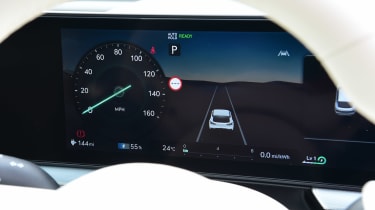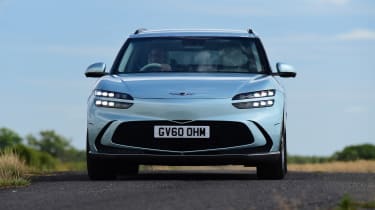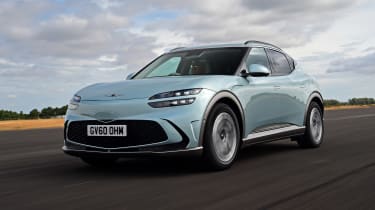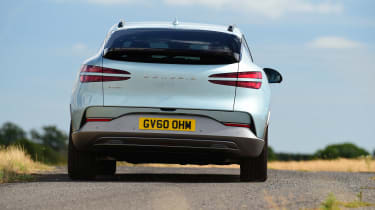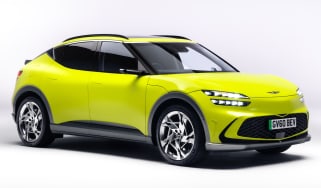Genesis GV60 review
The Genesis GV60 is a sleekly styled luxury SUV based on many of the same parts as the excellent Hyundai Ioniq 5
Pros
- Good to drive
- Luxury interior
- Rapid charging technology
Cons
- Small boot
- Unknown brand
- Expensive to buy
| Model | Range | Wallbox charge time | Rapid charge time |
|---|---|---|---|
| Premium | 321 miles | 11hrs 45mins (0-100%, 7.4kW) | 16mins (10-80%, 239kW) |
| Sport | 292 miles | 11hrs 45mins (0-100%, 7.4kW) | 16mins (10-80%, 239kW) |
| Sport Plus | 289 miles | 11hrs 45mins (0-100%, 7.4kW) | 16mins (10-80%, 239kW) |
The Genesis brand launched in the UK in 2021, and while the South Korean marque already offers three compelling electrified models, only one has been built as an electric car from the ground up: the Genesis GV60.
Based on the same underlying parts as the excellent Hyundai Ioniq 5 and Kia EV6, the Genesis GV60 is a supposedly premium take on the SUV formula. The maker hopes that its five-year ownership proposition (more on that below), as well as the car’s ultra-contemporary styling, will offer buyers something unique in the market. The GV60’s main rivals include the Tesla Model Y, Mercedes EQA and Audi Q4 e-tron, among others in the compact premium family SUV class.
There are three flavours of Genesis GV60 to choose from: all cars get the same 77.4kWh battery (also seen in the EV6), but each version offers a different motor combination and power output. Entry-level Premium cars get a single motor with 226bhp – good for 0-62mph in 7.8 seconds. Sport adds a motor to the front axle for a total of 314bhp, while Sport Plus ramps this up to 483bhp, with a Boost mode slashing the 0-62mph time to four seconds flat.
So far, we’ve driven both the Premium and Sport Plus cars, and for most types of driving, the less powerful option should suit most buyers – especially given the Sport Plus costs over £13,000 more than the base car. Even in Premium-spec, acceleration is strong and helped by a slug of instant torque, with the car feeling tied down and lighter on its feet than the flagship dual-motor model.
That’s not to say that the Sport Plus isn’t an entertaining car to drive – hit that Boost button and push the throttle pedal to the floor, and the GV60 pins you back in your seat. It’s a more refined and linear experience than you get in a Tesla Model Y, for sure, but there’s no denying it’s fast.
Otherwise, though, grip is excellent even in the single-motor car. There is a little bit of roll through the corner, but overall you get a sense that the car is communicative and predictable to drive. It’s hard to make a judgement on ride comfort given the smooth roads of our German test route, but even with Genesis’ trick camera-controlled damping, the ride seemed more fidgety on top-spec models with 21-inch wheels.
We also really liked the regenerative braking setup. It’s not dissimilar to the system you’ll find in the Ioniq 5, with the various settings accessed using paddles fixed to the back of the steering wheel. The adaptive mode worked particularly well, allowing us to do around 90% of our driving on just one pedal.
The GV60’s weakest point is its steering, although even this doesn’t present serious cause for concern. It’s a little lighter than we’d like, and there’s a flat spot around dead centre that results in a lack of feel at times. Flip the car into Sport mode and the steering does become slightly heavier, though, so all is not lost.

As mentioned above, all GV60s get the same 77.4kWh battery, with the most efficient Premium version boasting the longest range: 321 miles. We saw closer to 280-290 miles in mild weather during our tests, with seemingly little degradation after a high-speed run on the motorway. Sport and Sport Plus cars are quoted at 292 and 289 miles respectively.
Like its Kia and Hyundai cousins, the Genesis benefits from the latest 800-volt electrical architecture, allowing for ultra-rapid charging, peaking at nearly 240kW if you can find a fast enough public point. That’s sufficient to top up from 10% to 80% capacity in under 20 minutes – although you’re probably better off banking on around half an hour from a 150kW unit, which is much more easily found in the UK right now.
In terms of specifications, every version comes well equipped. Premium cars (from just under £54,000 at the time of writing) have LED lights, alloy wheels, twin 12.3-inch infotainment screens and heated massage seats, plus a reversing camera and an electric tailgate. The more expensive (+£4,460) Sport brings the extra motor and unique 20-inch alloys, while Sport Plus adds a limited-slip differential, even bigger wheels and different trim for the cabin. Prices for this start from just over £67,500.
As we’ve already seen in the EV6 and Ioniq 5, the Hyundai Group’s dedicated electric-car platform allows for masses of interior space thanks to its completely flat floor. The GV60, too, takes full advantage of this, with loads of legroom for all occupants to enjoy. Headroom in the rear is only an issue for those over six feet tall, made worse on cars fitted with the panoramic roof.
The boot isn’t quite as impressive, however, measuring in at an average-for-the-class 432-litre capacity (in comparison, the Audi Q4 e-tron offers 520 litres). There’s sufficient space in the nose for the charging cables, although all-wheel drive versions get less room up-front than those without a motor on the front axle.
Elsewhere, we have no complaints about either the quality of materials used in the GV60’s cabin, or the capability and user-friendliness of its in-car technology. The electronically rotating gear selector really helps add some extra wow-factor to the Genesis’ already beautifully-appointed cabin. The dual infotainment displays are crisp and responsive, while Apple CarPlay and Android Auto come as standard if you'd rather use your phone's software. We also like how screens have been mixed with physical toggle controls for the climate settings, making the car feel modern without taking away from the overall ergonomics.
Facial recognition technology has been added for 2023, which allows owners to lock/unlock their car without the need for a key to be present – all via a sensor mounted on the B-pillar. This technology, dubbed Face Connect by Genesis, can also ensure that each assigned driver’s preferred settings (climate controls, seat positioning, drive mode etc.) are all preconfigured the moment they step in the car.
While this is designed to make GV60 ownership even easier, some may find the idea of having their likeness stored somewhere disconcerting. Thankfully, all of your data is encrypted and stored within the car itself, plus the feature can be disabled altogether if you wish via the infotainment system.
Perhaps the only real stumbling block for buyers may be the unfamiliar badge – name recognition among the public isn’t quite there yet and not everyone wants to spend ages explaining exactly what it is they drive.
Genesis hopes its unique owner experience will sway buyers looking for a new type of luxury, however. Every car comes with a five-year warranty, five years’ servicing and roadside assistance, plus mapping and over-the-air software updates for the same period. The company will collect and drop off your car on a covered transporter whenever it’s booked in for work, and you’ll be assigned a Genesis ‘personal assistant’ throughout. Time is a Genesis customer’s most valuable asset, apparently.
It’s easy to dismiss the Genesis GV60 as a tarted-up Ioniq 5, but the Hyundai Motor Group’s premium brand has managed to properly distinguish its electric SUV offering from other models sharing the E-GMP platform underpinnings. The GV60’s interior feels truly special, while the battery and electric motor setup provide a good blend of range and performance. There are more practical options out there, but the Genesis remains a great choice if you wish to stand out from the growing number of Teslas and German electric SUVs on British roads.
